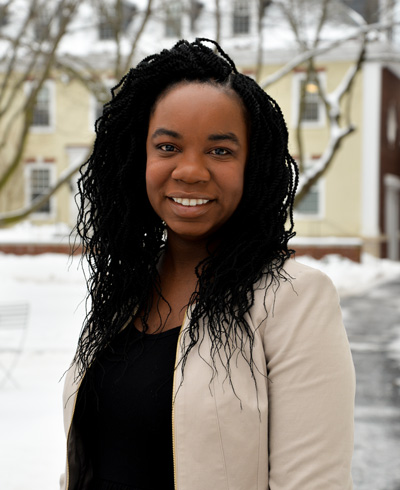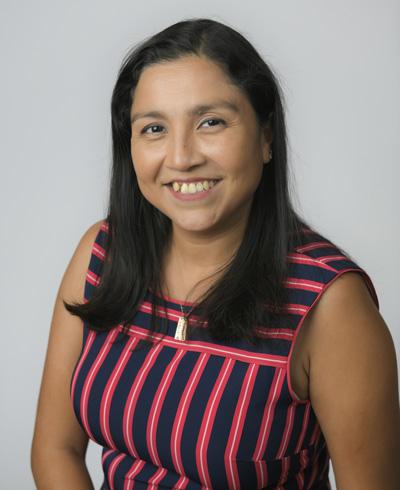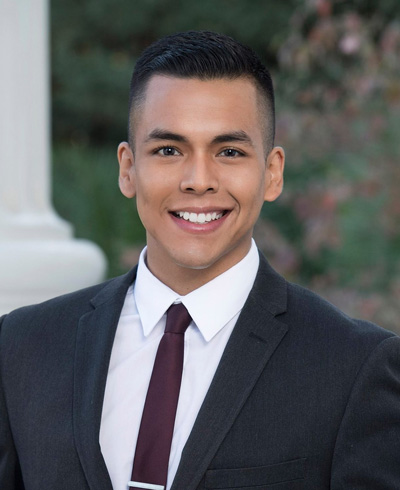“There’s also a process for families to get assistance who’ve had a change in income or loss of job due to COVID-19,” Kulju says. “Students should go to their campus website for instructions and fill out a request for a re-evaluation based on their change in financial circumstances.
“It would be shortsighted to panic and say, ‘I’m not going to go to school,’” Kulju continues. “And then where are you four years from now?”
We spoke with four CSU alumni who received financial aid to get their take on how earning a college degree forever changed their lives.
AVIS ATKINS

AVIS ATKINS
Campus: California State University, Long Beach
Major: B.A., Psychology, Sociology and Human Development
Year graduated: 2011
Financial aid received: Pell Grant, Cal Grant, Long Beach Rotary Scholarship
Current position: Senior strategic financial analyst at Google
How did financial aid contribute to your student success? Financial aid was the key to my success at CSULB. Although I worked while in school, receiving financial aid allowed me to work fewer hours and focus on my studies and extracurricular activities. Without it, I would not have been able to take the challenging courses that prepared me for graduate education at Harvard University.
How did earning a college degree affect your social mobility? Earning a college degree changed my life’s trajectory. My mother was a homemaker and my father worked as a tour bus driver for many years. Neither one of my parents had a college education. However, both of them pushed me to excel in my studies, and through the
Long Beach Promise, I was able to attend CSULB. After being the first in my immediate family to receive a degree, I obtained my master’s in education policy and management from the Harvard Graduate School of Education. I worked a few years in finance in New York and this year I will be graduating from Harvard Business School. There is absolutely no way I would be on this path without obtaining my degree from CSULB.
How would your life be different without a college degree? I do not want to imagine my life without a college degree. Without one, I would not have been able to work in New York, attend Harvard University or work at Google.
What advice do you have for those who are questioning attending college? I was in your shoes. As a first-generation college student with working-class parents, my family did not have any money saved for my education. I had to fund my college degree with my own money. I even took out some loans. But investing in myself by attending college was the absolute best decision I have made in my life. My college degree introduced me to both personal and professional opportunities that have allowed me to accelerate my career and personal development.
If you are on the fence about whether or not to attend college, please go! I haven’t regretted this decision.
VINCENT MARSALA
 Photo taken in January 2020 by
Photo taken in January 2020 by
Tom Zasadzinski
VINCENT MARSALA
Campus: California State Polytechnic University, Pomona
Major: B.S., Civil Engineering
Year graduated: 2017
Financial aid received: Scholarships
Current position: Superintendent at Turner Construction Company, which is managing the construction of SoFi Stadium in Inglewood, future home of the Los Angeles Rams and Los Angeles Chargers
How did financial aid contribute to your student success? After serving in the Marine Corps, I was utilizing the GI Bill for the first few years. I expended all benefits with a year of school remaining, so I began growing debt with student loans. I worked almost full-time and became overwhelmed with having to commute from my place in Long Beach to work in Downtown L.A. and then to campus in Pomona. I was starting to earn poor grades and fall behind. Desperate for help, I went into the
Veterans Resource Center on campus to see what benefits were available to me. I immediately connected with the other veterans in the room and felt the camaraderie and friendships I had been longing for. The Veterans Resource Center provided me with scholarship opportunities, a job on campus, free printing and snacks. Being able to get involved on campus and move closer took away all those other distractions, and I was able to apply that time to my education. I immediately saw results and improved my GPA tremendously. It made me want to continue school rather than getting that feeling of, ‘Ah, I’m never going to finish, and it’s just impossible.’ It really reignited my fire to complete the rest of my degree.
How did earning a college degree affect your social mobility? Well, since graduating and starting my career, I have been able to purchase a brand-new home and truck. I love what I do each and every day. I’m able to be part of a monumental project that’s known worldwide. This site will host the Olympics and the Super Bowl. It helped me evolve socially as well as educationally. It gave me experience in real time and helped me build relationships with people involved in the industry. Going to college and receiving a degree with a construction background directly applies to my work in the field. Being able to experience it firsthand put me well above people who don’t get that hands-on experience through the university.
How would your life be different without a college degree? Without finishing my degree, I’d either be struggling and figuring out what I want to do or pursuing a hands-on trade. I’ve always been driven, but by finishing my degree and being able to immediately apply it, I was able to find a love and passion for what I do.
What advice do you have for those who are questioning attending college? With anything, you have a risk and a benefit. You have to take risks to receive benefits. The benefit of a degree far outweighs the cost of the education, especially in the Cal State system. You’re able to make an income immediately out of college that allows you to repay debts, if any.
There’s a scholarship available for just about everyone. If you don’t view the CSU website or your specific university’s website and seek those scholarship opportunities, then you’re really missing out. There’s so much money that goes unspent on something you might’ve qualified for that you didn’t even know about. No matter what it takes, just finish.
VANESSA MAGER

VANESSA MAGER
Campus: California State University, San Bernardino Palm Desert Campus
Major: B.A., Business Administration with a concentration in Management
Year graduated: 2016
Financial aid received: Scholarships and Cal Grant
Current position: Management analyst for the City of Palm Desert
How did financial aid contribute to your student success? Financial aid helped me graduate on time and without any debt. As a single mom of two kids, the financial aid assistance and scholarships were the difference between me achieving my degree or postponing completion. I remember my last year at CSUSBPD, I was short $1,500 to cover the cost of books and parking and thought I would have to possibly wait another year to complete my degree. Fortunately, I was awarded a $1,500 scholarship and was able to earn my degree on time. I am extremely grateful to the individual who donated that scholarship to the campus.
How did earning a college degree affect your social mobility? Earning my college degree allowed me to be in the position I am today. The city requires a bachelor’s degree, and after applying three times prior to earning a degree, I finally secured an interview and my job after graduation.
How would your life be different without a college degree? Without my degree, I don’t think I would have the career I have now. Without that career, I wouldn’t be able to provide for my family the way I am, especially during this time.
My college degree has also inspired my daughters to pursue college when they are of age. I’m currently working with my oldest daughter, who is a junior in high school, by getting her ready to start applying for colleges and financial aid. My experiences have provided the knowledge to assist her through the process. I may have been the first in my family to earn my bachelor’s degree, but I am proud to inspire my children and others to pursue higher education so I won’t be the last.
What advice do you have for those who are questioning attending college? It’s simply this: Don’t question it, just go. If you are even considering going, then you shouldn’t let the cost of education deter you from pursuing it. I understand the worries that come with affording college, but there are so many scholarships and grants available to students, the money is there. I think prospective students should explore the financial options available to them both within the CSU and elsewhere as there are a lot of organizations that provide scholarships; prospective students just need to apply themselves accordingly.
JORGE REYES SALINAS

JORGE REYES SALINAS
Campus: California State University, Northridge
Major: B.A., Journalism; M.A., Communication Studies
Year graduated: 2015/2018
Financial aid received: My freshman year at CSUN, I did not receive any financial aid. It was right after the 2008 recession; I was very fortunate to be working full-time and paying half of my tuition and my parents paying the other half. I signed up for a campus payment plan to be able to meet the deadlines. In 2011, the California Dream Act was signed for undocumented students to receive financial assistance for college, which alleviated a lot of the financial stress I was going through at the time.
Current position: Communications Director in the California State Assembly for Assembly member Monique Limón
How did financial aid contribute to your student success? It was a huge help! I was able to work a lot less and focus more on school and extracurricular activities I wanted to be a part of. I was able to join student government, clubs that related to my major and Greek life. It was also extremely beneficial for my mental health; I finally did not have to worry about paying out of pocket and living within a tight budget.
How did earning a college degree affect your social mobility? It opened a lot of doors I did not even imagine it could. It was not only the learning inside the classroom but also learning outside of it through organizations and leadership roles. I remember contemplating dropping out and taking a year off school after my freshman year because I didn’t think I would be able to afford it. If I had done that, I would’ve not been able to graduate at the time I did and been presented with the opportunity to be student body president and later serve as a CSU student trustee.
How would your life be different without a college degree? I don’t think I would’ve met the great mentors and faculty I had the pleasure of building relationships with; being able to go through higher education is a privilege and a huge opportunity because of the experience an individual can make of it. The CSU is such an extensive network, not just your campus, but all 23. It is a rare time when I do not meet someone who graduated from a CSU at work events.
What advice do you have for those who are questioning attending college? These are rough times, and if the opportunity is there for the student to benefit from financial aid and scholarships, do it. The CSU is adapting to the new way of learning, and people can still be involved in organizations and networking opportunities through online platforms campuses are utilizing.
Financial assistance is there, and there are many scholarships alumni create or donate to for students. It is vital for students to familiarize themselves with the resources the campus has and talk with a financial aid counselor or someone on campus who has gone through the process of applying for financial aid and scholarships.
To explore various financial assistance options at the CSU, visit the
financial aid site.